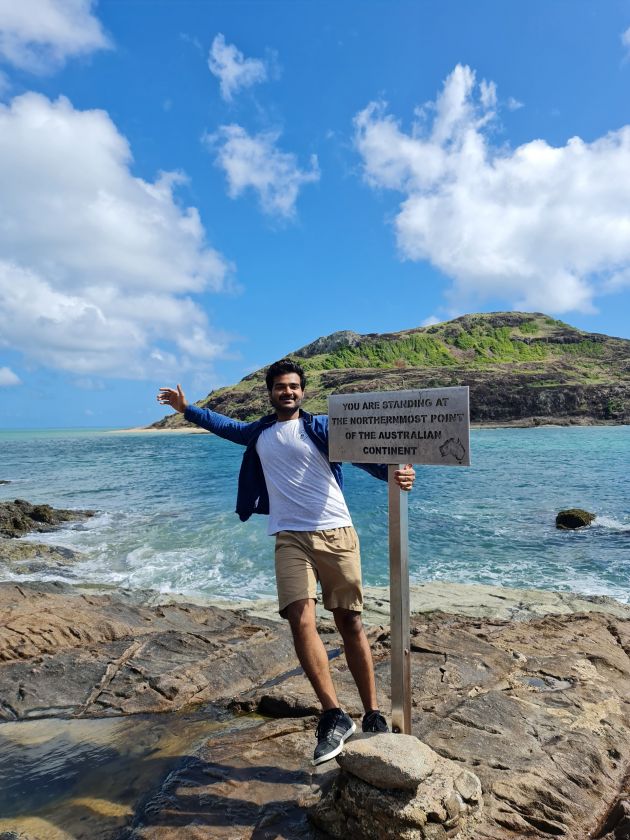Placement puts rural generalism in focus
For sixth-year Bachelor of Medicine, Bachelor of Surgery (Honours) student Harman Sharma, ten weeks of rural placement on Thursday Island (Waiben) sparked an interest in exploring a career in emergency medicine or rural generalism.
ED is an exciting place that is fast-paced, requires quick clinical reasoning, and has hands-on procedural opportunities,” Harman says.
“However, this year, I have met some phenomenal rural generalists who are trained as GP anaesthetists, GP obstetricians and GP mental health physicians. I am interested in becoming a GP anaesthetist and am open to both ED and rural generalism. I would like to gain experience and learn procedural skills from ED and, a few years later, do GP training to maintain a good work-life balance.”
Harman says the best thing about being on Waiben for placement was the doctors who made him feel part of the team and offered an experience that he feels will make him comfortable and confident for his intern year.
“I saw patients across general practice, emergency, medical/surgical areas, and gained exposure to anaesthetics. Out of all these areas, GP was my favourite”.Thursday Island Hospital is a referral hospital for 17 primary health care centres in the Torres Strait with services that include general medicine, maternity, and emergency care.
A learning adventure and real impact
Harman shares his most memorable experience on Waiben, an island situated approximately 40km from the mainland of Australia and popular placement destination for JCU students.
“My most memorable experience was a weekend shift with my supervising doctor. It was a busy day, and my supervisor had allocated me to see all ED presentations. There were a variety of presentations ranging from skin abscesses to cardiac issues. I enjoyed having the responsibility of seeing ED patients and managing them alongside my supervising doctor.
I also had the opportunity to visit the tip of Australia and go on a chopper ride to Moa Island for an overnight clinic visit – that was pretty amazing too.”
Waiben is defined under the Modified Monash Model (MMM) as ‘very remote’ in category 7 which translates to a wide variety of medical presentations, indicating a high need for rural generalism. Understanding the MMM classifications helps distribute the health workforce better in rural and remote areas.
Rural background, prior generalist intentions, rural practice self-efficacy and the overall influence of the rural clinical school experience are associated with medical students’ interest in remote and very remote practice.
Medical students at JCU gain extensive clinical skills and an above-average 3,370 hours on placement to make a positive impact to the health of regional, rural, remote and Australian Aboriginal and Torres Strait Islander communities during and after studies.
Harman has travelled to many locations on placement, including Broome, Derby, Darwin, Katherine, Mount Isa, Proserpine, Ingham, and Thursday Island.
“Each location taught me something new and helped me develop my current perspective on the importance of healthcare delivery, especially to the underserved. From a social perspective, I have made lifelong friends who are always keen on spontaneous adventures. That is what university is – a combination of study and social fun.”
Harman’s advice to other students embarking on their placement; “Go there with an open mind, interact with the local community and take every opportunity to make lifelong memories.”
“The Thursday Island GP centre is a prime example of how a strong and holistic primary healthcare centre improves chronic disease management and reduces ED presentations."
JCU Medicine Student Harman Sharma



Why medicine and the honours program?
A combination of factors led Harman to pursue a career in medicine. Exposure to the Indian healthcare system during his childhood, and observing how it managed a sick family member, planted a seed in Harman’s mind to become a doctor and provide more accessible care.
Harman moved to Australia when he was 10, and during high school he completed work experience at different healthcare services, such as hospitals, GP clinics, and even a dialysis centre.
“These early experiences in rural, remote, and Aboriginal and Torres Strait Islander health assisted me in deciding to become a health professional, with JCU being my first option,” Harman says.
“I applied for medicine at JCU because of the emphasis on rural, remote, and Aboriginal and/or Torres Strait Islander health. I started in medical school with the intent of returning to and providing care to small communities. I am glad I am staying true to this as I am going to the Royal Darwin Hospital for an internship next year.”
Harman chose to undertake Honours in the final two years of his Bachelor of Medicine, Bachelor of Surgery (MBBS) degree.
His research project delved into the role of interleukins (a group of cellular messenger molecules), in diagnosing diabetic foot osteomyelitis.
“The prevalence of diabetes mellitus is increasing worldwide; consequently, the risk of foot ulcers and osteomyelitis increases. My project looked at determining simple blood tests that can diagnose diabetic foot osteomyelitis and reduce the need for expensive imaging that cannot be performed in resource-limited settings,” he said.
“Through Honours, I have not only learnt key research techniques and developed data analysis skills, I also established a good network with other academics and researchers. Moreover, getting a few publications out of my Honours research has also been very rewarding.”
A pathway available to JCU students is to pursue Honours over year 6 and their intern year (or any time up to postgraduate year 5). Alternatively, once a medical student has completed the first three years of the Bachelor of Medicine, Bachelor of Surgery degree a one-year Bachelor of Medical Science (Honours) is also available. With this option, JCU MBBS students can take one year out of the degree to undertake a full-time research project before re-joining the MBBS.
We love to showcase the placement experiences of our students, like Harman. If you are a JCU Medicine, Dentistry or Pharmacy student and would like to share your placement experience, please contact us.